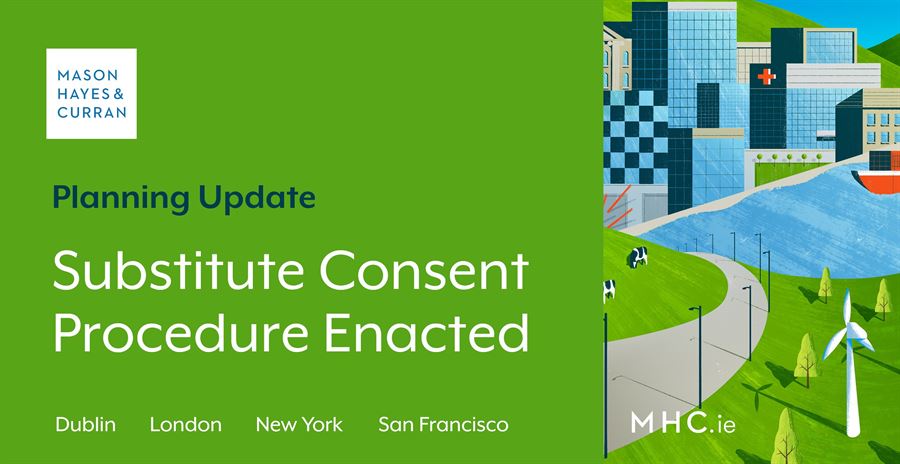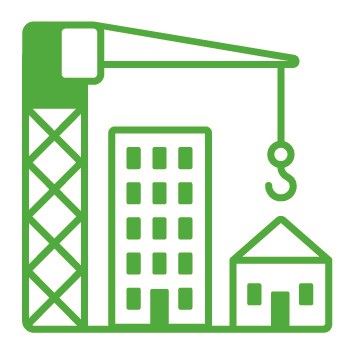Planning Update: Substitute Consent Procedure Enacted

The Substitute Consent process allows developers to apply to An Bord Pleanála, Ireland’s planning authority (the Board), for permission to regularise permission for certain developments. Developments that come within the scope of the process are those that are found or considered to be non-compliant with provisions of EU law. The Substitute Consent process was thrown into chaos last year when the Supreme Court struck down provisions of the legislation regarding the requirement to demonstrate “exceptional circumstances” for regularisation. It also highlighted the requirement that members of the public should be able to participate in the process from the initial stage. Read our previous insight on this topic here
What this meant in effect was that any developments which may have found themselves on the wrong side of the law, had no way to 'cure' their particular legal problem, with the result that affected developments could not proceed.
Supreme Court decision
The Supreme Court's decision had significant impacts on activities across a number of particular industries such as those in the quarrying and peat extraction industries. Individual developments already in the process of applying for Substitute Consent or preparing for similar applications were also affected. The decision in particular had a considerable impact on the commercial operations of Bord na Móna, which had to halt extraction of peat on over 30 hectares which was the subject of a High Court decision in September 2019. This decision quashed an exemption from planning permission for industrial extraction of peat, requiring the company to first obtain 'Substitute Consent'. In January 2021, Bord na Mona announced that they are suspending ongoing applications for Substitute Consent as they are permanently ending peat extraction activities. In addition, the decision had impacts on other peat extraction companies supplying peat for mushroom farms.
 New provisions
New provisions
In response to these concerns the Government introduced amendments to the Planning and Development and Residential Tenancies, Bill 2020 to provide for a reconstituted Substitute Consent process. The amendments were introduced in the Oireachtas in early December 2020 and passed by the Oireachtas on 16 December. The rushed nature of the debate on the legislation was severely criticised by opposition politicians.
The new provisions are inserted into Section 177 of the Planning and Development Act, and provide for amendments to the Substitute Consent procedure as follows:
- “Exceptional circumstances” must be considered by the Board in the substantive or second stage application for substitute consent, and
- Public participation is facilitated with respect to the consideration of “exceptional circumstances”, as well as on the wider application of substitute consent
Applying the new provisions
The amendments are to apply to both new and existing applications pending before the Board.
The amendments maintain the format of the two-stage Substitute Consent process, concerning an initial 'leave' application stage followed by a 'substantive' application stage.
The amendments provide that the Board at the 'substantive' application stage can only grant substitute consent where it is satisfied that “exceptional circumstances” exist which would justify the grant of such consent.
In making that determination, the Board cannot be bound by or have regard to any determination made by it at the 'leave' stage as to the existence of “exceptional circumstances”. A Board member who considered the application at the 'leave' stage is precluded from participating in the determination of the substantive application stage.
Furthermore, the public is now to be afforded the opportunity of making submissions on whether “exceptional circumstances” exist which would justify the granting of Substitute Consent. In addition, transitional arrangements are provided for public participation on resumed applications for Substitute Consent.
Conclusion
The amendments to the legislation deal with the two issues which were at the core of the Supreme Court decision last July, namely public participation and “exceptional circumstances”. It is hoped that the amendments will allow those applications which were affected by the decision to resume their consideration by the Board. The fact that there is now the potential to regularise developments which may have been affected by the loss of a regularisation process will come as a relief to many developers.
However, it remains to be seen as to how the Board will apply the 'exceptional circumstances' test in practice. There had been a criticism of the Board by environmental campaigners that many of the Board's decisions gave insufficient attention to the requirement that regularisation only be permitted in “exceptional circumstances”.
In that regard, the decisions made by the Board under the new procedure will be closely scrutinised to see if there is any substantive approach in their analysis of the “exceptional circumstances” test, and as with all contentious areas of environmental and planning law, it is likely that further litigation concerning the Substitute Consent process will ensue in due course.
For more information, please contact a member of our Planning & Environment team.
The content of this article is provided for information purposes only and does not constitute legal or other advice.
Share this:


